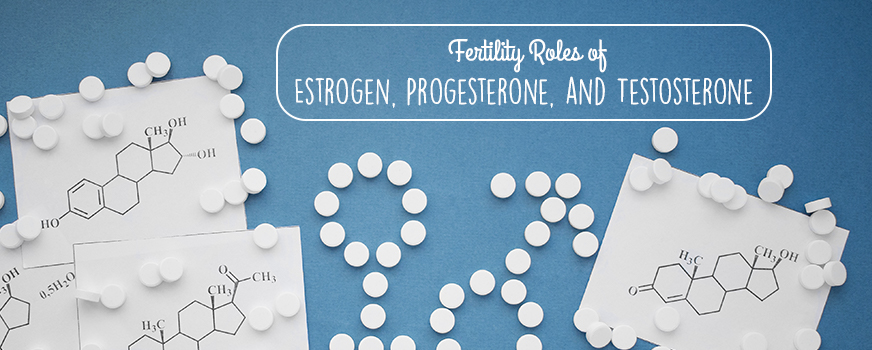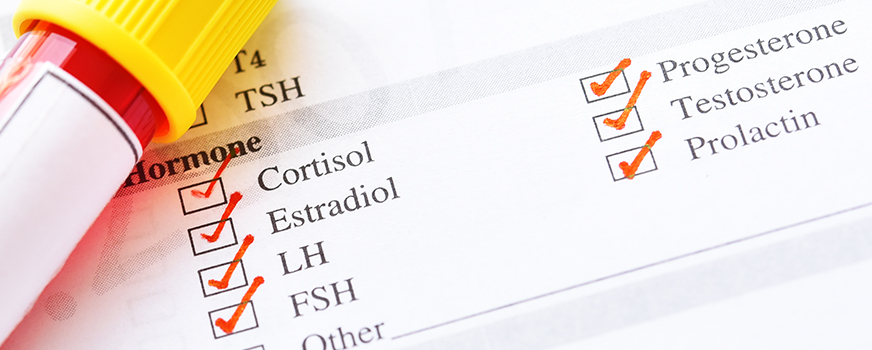
Your hormones play a huge role in fertility. Learn more about three of the main fertility hormones, what each does during the process, and what you can do to help achieve healthy levels of each hormone to have more success with conception. For both male and female fertility hormones, read on to learn more about the roles of estrogen, progesterone, and testosterone in fertility and how they may affect your chances of conceiving.
Estrogen and Fertility
Estradiol and estrogen are both very important factors in fertility hormones. Estradiol is one of the most important forms of estrogen. The level of estradiol in a woman’s system can provide insight into her ovarian function and the quality of her eggs. If the estrogen levels in the body are too high or too low, it changes the fertility levels of the women.
Estrogen holds utmost importance because it is necessary for the functioning of the uterus, both in the growth and maintenance of the uterine lining (endometrium) so that the fertilized egg can implant in the uterus with ease which will, in turn, result in sustaining a pregnancy.
This is why women who intend to be pregnant are given estrogen in the form of estradiol in case of estrogen deficiency. Too little estradiol can lead to an absent or disrupted menstrual cycle, as well as general infertility. Overall, low levels of estrogen are associated with menopause – common symptoms include mood swings, absent or irregular periods, headaches, hot flashes, and more.
If the levels of estradiol are too high, you might encounter issues with fertility as well as endometriosis and polycystic ovary syndrome (PCOS) – both of which are associated with infertility. Elevated levels of estradiol are also correlated to lower in vitro fertilization (IVF) success because they are associated with decreased response to ovulation induction medication.

Progesterone and Fertility
Progesterone, also referred to as “the pregnancy hormone,” is a common female hormone found naturally in a woman’s body. It also happens to play an essential role both before and during pregnancy. When a fertility workup is suggested, there are two main sex hormones an overseeing medical provider will look test: estrogen and progesterone.
Progesterone (as a prescribed hormone supplementation) is often necessary during Assisted Reproductive Technology (ART) procedures, such as in-vitro fertilization, partly because the medications you may use during these procedures can suppress your body’s ability to produce progesterone. Certain procedures can even unintentionally remove progesterone-producing cells from your ovaries.
Sometimes, there are other reasons to use progesterone supplementation, such as little or no progesterone production from the ovaries or poorly developed follicles that do not secrete enough progesterone to develop the uterine lining. After ovulation occurs, the ovaries start to produce progesterone needed by the uterus. Progesterone causes the uterine lining or endometrium to thicken.
After successful conception, progesterone is important during pregnancy as it helps maintain a supportive environment for the developing fetus. Low levels of progesterone can negatively affect fetal development, so it is essential to monitor progesterone hormone levels through all phases of your fertility journey.

Testosterone and Fertility
Testosterone is a key male hormone that plays an important role in sex drive and making sperm, which can affect male fertility if testosterone levels get too low. It’s standard practice to check a man’s sperm count when a couple has difficulty getting pregnant. If sperm count is low, the next step is to measure testosterone.
Low testosterone does not always directly cause infertility. Men with low testosterone can still produce healthy sperm because sperm production is mainly stimulated by other hormones. However, low levels of testosterone may result in decreased production of sperm. The levels of testosterone in the testicles, where sperm is produced, are much higher than testosterone levels in the blood.
Low testosterone’s indirect effect on fertility involves a reduced sex drive that can result in a lack of desire to even have sex. It can also cause erectile dysfunction by causing a man to have fewer erections or erections that aren’t as strong as they once were. This can make it difficult to reach climax or to have sex often enough for reproduction.
Overweight and obese men tend to have lower testosterone levels because excess belly fat converts testosterone to estrogen, another hormone. Living a healthy lifestyle will likely have the largest impact on increasing testosterone levels, and is more reliable than testosterone replacement therapy in terms of increasing sperm count.
Hormones are one of the most important factors to monitor if you are trying to get pregnant, especially estrogen, progesterone, and testosterone. Having levels that are too high or too low can affect your chances of successfully conceiving a child. If you or your partner feel as if you are struggling with fertility hormone issues, there are many options to help get your hormones to the right levels! Reach out to a fertility specialist at Red Rock Fertility Center to find the best options to start your fertility journey.



